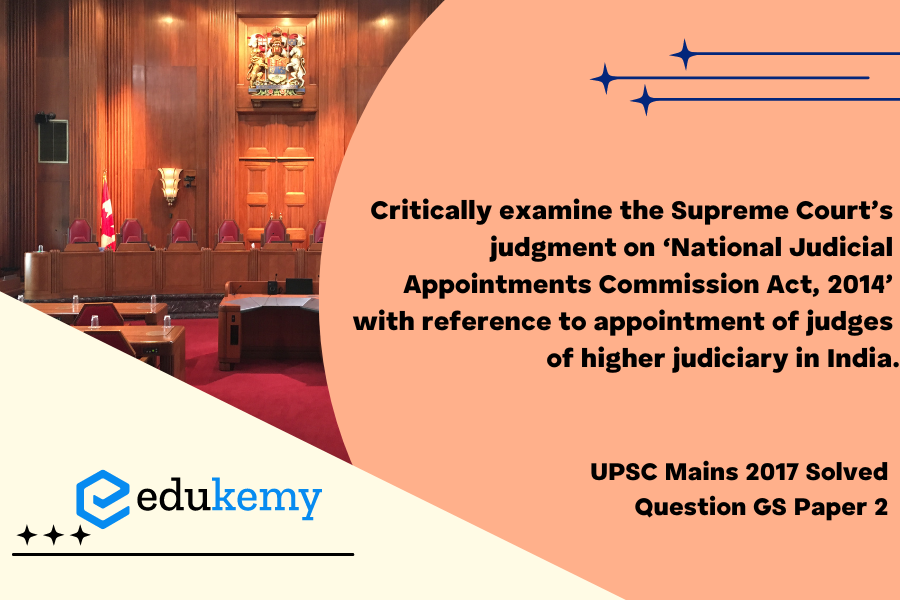The Supreme Court’s verdict on the ‘National Judicial Appointments Commission Act, of 2014’ marked a pivotal moment in India’s judicial landscape, prompting a critical examination of the constitutional implications surrounding the appointment of judges to the higher judiciary. The judgment, a response to the constitutional validity of the NJAC Act, delved into the delicate balance between judicial independence and executive interference in the appointment process. The Court’s scrutiny weighed the merits of the NJAC Act against the established collegium system, exploring issues of transparency, accountability, and the broader principles underpinning an impartial judiciary. This landmark decision not only shaped the trajectory of judicial appointments but also sparked debates on the separation of powers and the constitutional nuances governing the judiciary’s role in upholding the rule of law in India.
Tag: Governance & Polity- Functioning of Judiciary.
Contents
Decoding the Question:
- In Introduction, try to briefly write about the National Judicial Appointments Commission Act, 2014.
- In Body,
- Discuss both arguments in favor and against the NJAC.
- Suggest some measures to improve the appointment process.
- In Conclusion, mention the overall view on NJAC and the need to reform the process of appointment.
Answer:
Recently the Supreme Court struck down the 99th constitutional amendment and held the view that NJAC (National Judicial Appointment Commission) is not a credible alternative to the Supreme Court’s collegium system of appointment of judges for the higher judiciary. The National Judicial Appointment Commission Act sought to replace the collegium system for appointment of higher judges and give civil society and executive to have a say in their appointment.
Arguments in favor of NJAC:
- Confidence of public: The diverse members in the selection committee of NJAC with the scientific selection criteria will help in building trust of people in judiciary.
- Efficiency: It will fill the large number of vacancies of judges which will address the issue of pending cases.
- Check corruption: It will also address the problem of nepotism and provide fair and equal opportunity to talented people.
- Undemocratic process: The collegium system was not proposed by the Constitution, it evolved by the judiciary itself and judges are not accountable.
- Transparent procedure: There is no official procedure of selection and selective publication of meeting records under the collegium system brings opacity in functioning.
- Against judicial guidelines: SC in the Second Judges Case (1993) laid down the principle of seniority while making the appointment, which has been violated many times.

Arguments against NJAC:
- Independent judiciary is the basic feature of the constitution. According to the 2nd and 3rd judge cases, in appointing the judges of higher judiciary primacy is given to the judiciary.
- The NJAC(National Judicial Appointments Commission ) Act, 2014 involves the executive along with the judiciary in such appointments. So the supreme court felt that the autonomy given to the judiciary was under threat, so it quashed the NJAC act.
- Judiciary don’t want to allow anybody into its sphere to maintain the integrity and transparency of the institution, but the question arises here is, are they maintaining that impartially?Most people opinion that judicial proceedings are opaque and nepotism is rising in appointments.
- Past experiences shows that post retirement posts became a regular phenomenon and giving opportunity to a limited number of people in such appointments is also a concern.
- So the executive thought to bring a mix of both herself and the judiciary in appointments. But to protect the constitution and its values, protecting the rights of people against the tyranny of executive and legislature we need an independent judiciary.
Measures to improve the appointment process:
- Amendment of NJAC: To ensure the independence of judiciary and maintain the separation of power.
- Written manual: Supreme Court can release a manual which should be followed during the process of appointment.
- Transparent process: All meetings should be in the public domain to ensure rule-based process.
- All India Judicial Service (AIJS): It can be introduced to address the problem of vacancies and opacity in procedure.
The independence of the Judiciary is a keystone of a healthy democracy, which should be preserved. Of course, the NJAC was not the last word on the issue, a fresh and more transparent procedure for appointments can be worked together by both the executive and the judiciary to maintain the faith of people in the judiciary and effective delivery of justice. The Constitution envisages and puts a system in place to ensure the balance of power involving the executive, the legislature and the judiciary but not at the cost of opaqueness in the appointment process. With evident loopholes in the collegium system, time has come for a review of the verdict by a larger bench.
In case you still have your doubts, contact us on 9811333901.
For UPSC Prelims Resources, Click here
For Daily Updates and Study Material:
Join our Telegram Channel – Edukemy for IAS
- 1. Learn through Videos – here
- 2. Be Exam Ready by Practicing Daily MCQs – here
- 3. Daily Newsletter – Get all your Current Affairs Covered – here
- 4. Mains Answer Writing Practice – here


